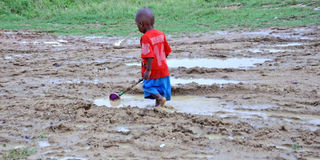Don’t be too cautious as dirt is good for your children, parents told

What you need to know:
- The types of microbes you receive depend on where you are born, how you are delivered, and every surface you touch in the first 24 hours of life
- Within days of birth there is a large amount of T-cell activity that creates tolerance in the immune system to the bacteria on the skin.
- If the immune system does not see a pathogen early in life, the body will not be trained to fight.
As Covid-19 continues ravaging the world, more children are spending less time outdoors.
They are also compelled to sanitise their hands among other safety measures like social distancing and handwashing.
Many parents consider it a priority to keep their children off the floor and surfaces they perceive to be dirty. This is mostly because of a notion that the little ones might get sick because of the germs they tend to pick up.
But, living a germ-free life according to experts may cause more harm than good when it comes to infants with a young developing microbiome.
From the moment we are born, our body is immediately populated by trillions of tiny microbes, the first of which come from the mother's birth canal, gut, skin, and breast milk.
The types of microbes you receive depend on where you are born, how you are delivered, and every surface you touch in the first 24 hours of life. Interestingly, these factors can impact your health well into the future.
Scientists at the University of California San Francisco found that within days of birth there is a large amount of T-cell activity that creates tolerance in the immune system to the bacteria on the skin. This is a critical factor in the immune system knowing not to attack the normal and healthy bacteria on the skin.
They are of the opinion that children who grow up in the village, go to daycare, or have pets are less likely to experience immune-related illnesses.
Dr Mansoor Saleh, the founding director of the cancer research centre at Aga Khan University believes if the immune system does not see a pathogen early in life, the body will not be trained to fight.
The expert says it is healthy to let your children be exposed to microbes at an early age so their immunity remains robust through to adulthood. "Patients with a weaker immune system have a higher risk of contracting cancer," he says.
The expert also warns against misuse of antibiotics.
He says they carpet bomb the microbiota, terminating both good and bad bacteria.
This has a very upsetting effect on the microbe composition, which in turn can affect asthma, allergies, obesity and diabetes among others.
By the age of three age, a child's microbiome stabilises and looks more like adults.
According to Save The Children, Kenya is a high-risk country for Covid-19 due to its relatively weak health system and challenging contexts.
This means that many children already have serious underlying health issues and Covid-19 will only exacerbate these vulnerabilities. These children include those who have compromised immune systems due to common illnesses in Kenya like pneumonia and malaria.
Last year, Pfizer/BioNTech and Moderna announced they were already testing a Covid-19 vaccine for children while Johnson & Johnson was planning to do the same.



